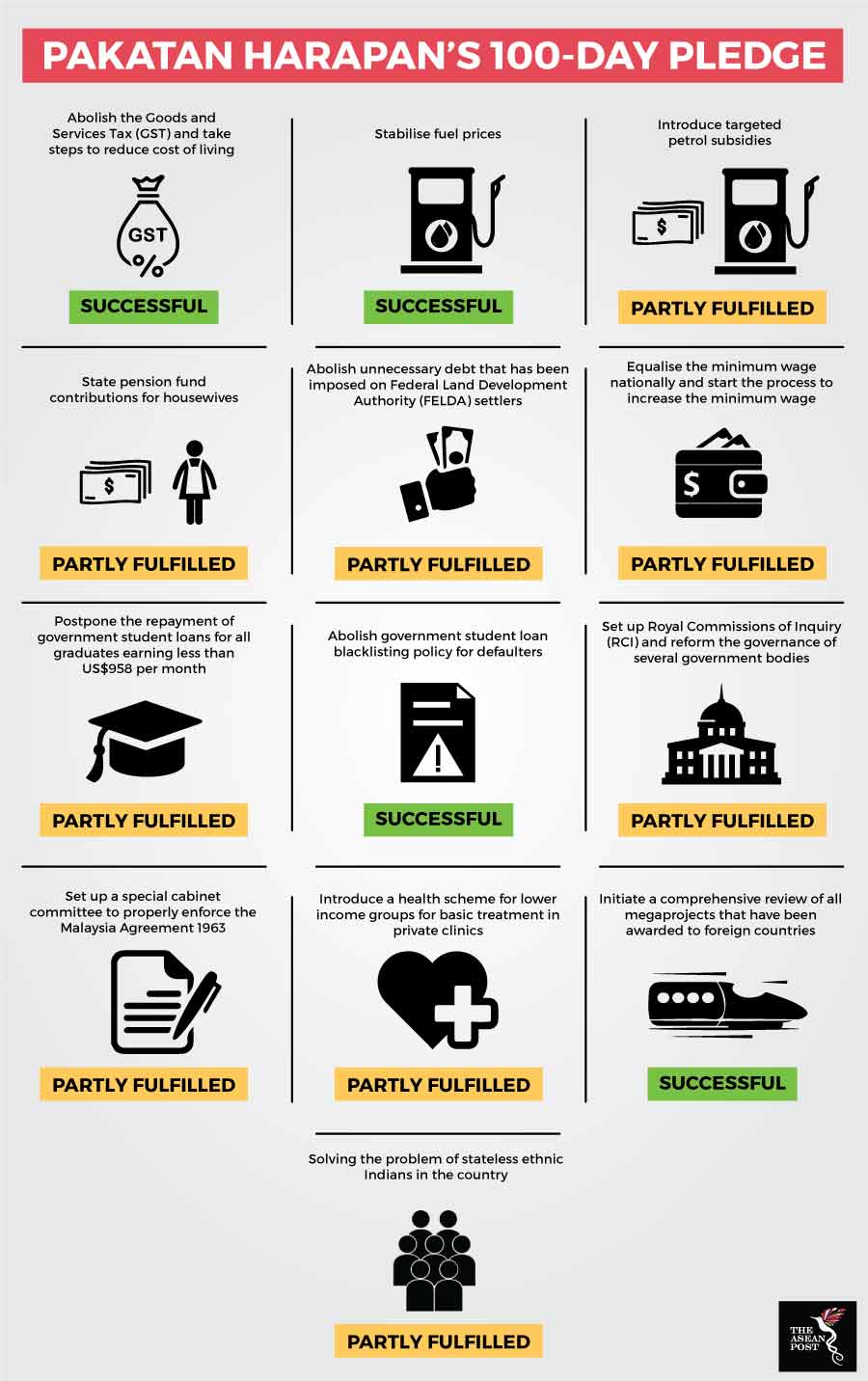As Malaysia continues along an unfamiliar path – having only tasted rule under one party for over six decades – the new Alliance of Hope (Pakatan Harapan) government headed by Prime Minister, Dr Mahathir Mohamed must be careful to not repeat the mistakes of the previous administration.
Since assuming office, Malaysia’s new government has wasted no time in admonishing its predecessor for incompetence whilst it held the reins of executive power in the country. Reform, like Rome, cannot be done in a day, hence just 21 out of the 60 promises pledged in the first 100 days of power have been fulfilled.
Naturally, the new government of Malaysia will have to be answerable to its critics for this shortfall but many have defended it by placing blame on the incompetence of the previous government led by Najib Razak’s National Front (Barisan Nasional) coalition. Najib has been under the international spotlight for his alleged involvement in the infamous 1MDB corruption scandal where he is accused of bleeding national coffers and raising the country’s debt to an “unprecedented” level.
This has resulted in newly minted Prime Minister, Dr Mahathir continuing to remain the apple of the public’s eye. According to Kuala Lumpur based pollster, Merdeka Centre, the nonagenarian premier enjoys a 71 percent approval rating with 56 percent of those polled stating that they are satisfied with the overall performance of the government in fulfilling its election manifesto to date.
In a national broadcast in conjunction with his government’s 100 days in office, Dr Mahathir hailed the landmark electoral victory as a “victory of the people” from “a thieving government.” He had previously stated that the manifesto served merely as a guide and isn’t a “bible” that must be followed religiously.
Promises fulfilled
Among the promises fulfilled by the new government of Malaysia include the stabilisation of petrol prices, the postponement of several mega-projects as a cost-cutting measure, starting a pension fund scheme for housewives and launching investigations into several government agencies in a bid to reform government institutions.
Yang Razali Kassim, Senior Fellow at S. Rajaratnam School of International Studies of Nanyang Technological University in Singapore gives Mahathir’s coalition an “A” mainly for bringing about regime change without the loss of lives or bloodshed.
“What the Alliance of Hope pulled off in the country’s recent general elections was nothing short of a peaceful revolt against a giant of an establishment. Not many countries have achieved this,” he told The ASEAN Post, adding that, people would be “realistic and reasonable in their expectations.”
“It’s not easy for a post-revolt society to bring about good government and good governance immediately after a political change. It is usually a political transition, which means it involves time and phases,” he added.

Source: Various sources
The Mahathir administration’s performance throughout its first 100 days will serve as a barometer for the remainder of the coalition’s five-year tenure.
Debt burden
Independent human rights organisation, Suara Rakyat Malaysia (SUARAM) hit out at the new government for “flip flopping” on policy decisions and for not dealing with reforms in a more urgent manner. The organisation which was formed at the height of Operation Lalang in the 1980s – when 106 of Mahathir’s detractors during his previous tenure as Prime Minister were detained without trial – also warned that there is a disturbing trend of autocracy symptomatic of his time in office then.
In a statement to the media, Kua Kia Soong, SUARAM advisor added that the debt burden left by the previous government is now a “convenient opt-out clause” for the current administration to backtrack on their pledge.
The actual size of Malaysia’s national debt is at the centre of much controversy. The country’s Finance Minister, Lim Guan Eng stated that the debt had breached the trillion-ringgit mark (US$251 billion). However, an ongoing dispute amongst economists remains as to whether government guarantees and lease payments under public-private partnerships should be included when calculating the debt.
Regardless, what is at stake is the economic fundamentals of the country in the long run, which, Lim has assured Malaysians, is still strong. Nonetheless, Kua said that the mythical “trillion-ringgit debt mountain” now serves as an “altar” on which, the promises made by the new government are sacrificed.
“This is definitely not acceptable as an excuse for putting off these urgent election promises since [the Alliance of Hope] had assured us that they could manage the economy once they had ousted [the National Front],” Kua added.
Kassim, who is an expert on Malaysian political developments stressed the importance of the new government in keeping its promises made throughout its five-year tenure.
“Deliver what you promised to the electorate. Build up trust between the government and the governed and never break the trust of the voters,” he said.
“These twin assets will ensure that the new government will be returned to power or be removed immediately by the people the moment they sense a breach in promise and in trust,” he warned.
